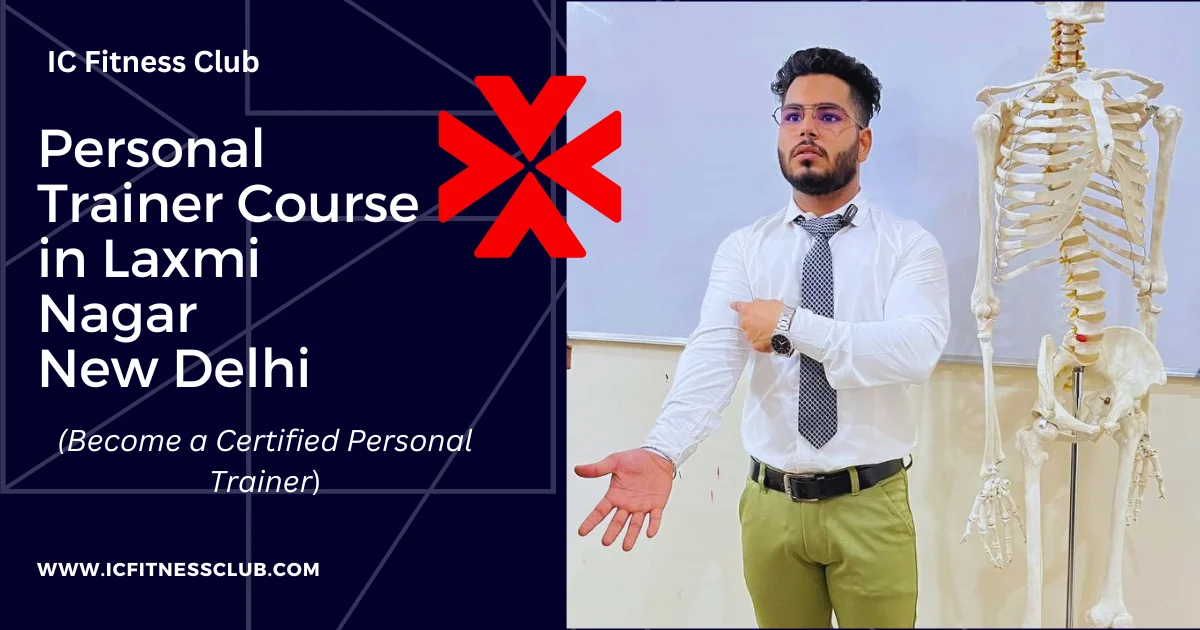Personal Trainer Course in Laxmi Nagar Delhi – IC Fitness Club
A personal training course in Laxmi Nagar Delhi is a program that prepares individuals to become certified personal trainers. The course typically covers a range of topics related to health, fitness, and exercise, including anatomy and physiology, exercise science, nutrition, fitness assessment, and program design.
Upon completing a personal training course, individuals may be required to take IC’s certification exam to become certified personal trainers.
A personal training course can provide individuals with the knowledge and skills necessary to become a competent and effective personal trainers, and can lead to career opportunities in various settings such as fitness centers, health clubs, and private studios.
Eligibility to become a Personal Trainer
The eligibility requirements to become a personal trainer may vary depending on the certification organization, country or state, or employer. However, here are some common requirements to become a personal trainer:
- Age: Most certification organizations require that personal trainer candidates be at least 18 years of age.
- Education: Some personal training programs may require a high school diploma or equivalent, while others may have no educational requirements.
- CPR/AED certification: Many certification organizations require candidates to hold a current CPR/AED certification.
- Fitness level: Candidates should have a reasonable level of fitness, as they may be required to demonstrate exercises and physical activities to clients.
- Passion for fitness: A passion for fitness and a desire to help others achieve their fitness goals is a key requirements for becoming a personal trainer.
- Knowledge and skills: Candidates should possess the knowledge and skills related to exercise science, anatomy and physiology, program design, and other areas related to fitness and exercise.
- Certification: Most employers and certification organizations require personal trainers to hold a nationally recognized certification, such as those offered by NASM, ACE, ISSA, or other reputable organizations.
Syllabus of Personal Trainer Course
Common topics that are typically covered in a personal trainer course:
- Anatomy and Physiology: The study of the structure and function of the human body, including the skeletal system, muscular system, cardiovascular system, and respiratory system.
- Exercise Science: The principles of exercise physiology, kinesiology, and biomechanics, including how the body responds to exercise and how to design safe and effective exercise programs.
- Fitness Assessment: The methods of assessing a client’s fitness level, including health history, physical fitness tests, and body composition analysis.
- Program Design: How to design and implement personalized exercise programs based on a client’s fitness goals, abilities, and preferences.
- Nutrition: Basic nutrition principles, including macronutrients, micronutrients, and hydration, and how to apply them to support a client’s fitness goals.
- Client Interaction and Communication: How to effectively communicate and interact with clients, including how to set goals, motivate, and provide feedback.
- Safety and Injury Prevention: How to prevent common injuries and accidents during exercise, including proper use of equipment, warm-up and cool-down, and stretching.
- Business and Professional Development: How to start and manage a personal training business, marketing, and legal considerations.
- CPR and First Aid: Basic life support and first aid techniques in case of an emergency.
Again, the specific syllabus may vary depending on the program or certification organization, but these are some of the common topics that are typically included in a personal trainer course.
Why become a personal trainer?
Becoming a personal trainer can be a rewarding and fulfilling career for several reasons, including:
- Help others achieve their fitness goals: Personal trainers work with clients to help them achieve their fitness goals, whether it’s weight loss, muscle gain, improved athletic performance, or overall health and wellness. Helping someone achieve their goals and see positive changes in their health and fitness can be a gratifying experience.
- Flexibility: Personal trainers have the flexibility to create their own schedules and work in various settings, such as fitness centers, gyms, private studios, or even online. This allows for a good work-life balance and the ability to work from almost anywhere.
- Personal and professional development: Personal trainers have the opportunity to continually learn and grow in their profession. They can attend workshops, conferences, and continuing education courses to stay up-to-date with the latest research and trends in fitness.
- Job security: The fitness industry is constantly growing, and personal training is a profession that is in demand. Personal trainers have job security, with the potential for advancement and career growth.
- Positive impact on health and wellness: Personal trainers play an important role in improving the health and wellness of individuals and communities. By promoting healthy habits and regular exercise, personal trainers can make a positive impact on the overall health of the population.
Overall, becoming a personal trainer can be a rewarding career for those who are passionate about fitness and helping others achieve their health and wellness goals.
Responsibility of a Personal Trainer
Becoming a personal trainer comes with several responsibilities, including:
- Ensuring client safety: Personal trainers are responsible for ensuring the safety of their clients during exercise sessions. This includes properly instructing clients on how to use equipment, spotting clients during exercises, and modifying exercises as needed to prevent injury.
- Providing effective and personalized exercise programming: Personal trainers are responsible for designing and implementing personalized exercise programs that are effective and appropriate for each client’s fitness level, goals, and abilities.
- Providing guidance on proper nutrition and healthy lifestyle habits: Personal trainers should provide guidance on proper nutrition and healthy lifestyle habits, such as sleep and stress management, to help their clients achieve their fitness goals.
- Continually educating themselves: Personal trainers should continually educate themselves on the latest research, trends, and best practices in the fitness industry. This includes attending workshops, conferences, and continuing education courses.
- Maintaining professional boundaries and ethical behavior: Personal trainers should maintain professional boundaries and ethical behavior with clients, including avoiding personal relationships and respecting client confidentiality.
- Building and maintaining relationships with clients: Personal trainers should establish and maintain positive relationships with clients to help them stay motivated and engaged in their fitness programs.
Overall, personal trainers have a significant responsibility to their clients to provide safe, effective, and personalized exercise programs and to help clients achieve their health and fitness goals.
to know more about IC’s personal trainer, visit below




